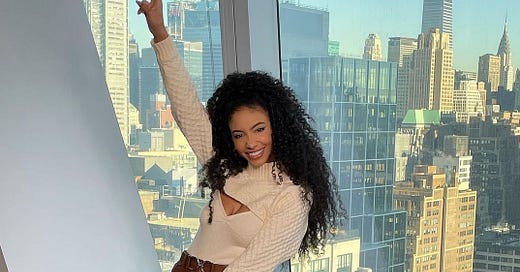Cheslie Kryst’s death reveals another TikTok blind spot
The 30-year-old lawyer and TV host died on January 30.
Embedded is your essential guide to what’s good on the internet, from Kate Lindsay and Nick Catucci.🧩
This post discusses suicide. If you or someone you know is struggling with depression or thoughts of self-harm or suicide, call the National Suicide Prevention Lifeline at 1-800-273-TALK for free, 24/7, confidential support and resources. —Kate
I sometimes worry that my internet usage has changed too much over the past year for me to write as effectively about life online. I’ve muted tons of words on Twitter, follow mostly ceramicists and small businesses on TikTok, and stopped using Instagram Stories. And yet, a video of the late Cheslie Kryst still found its way onto my FYP.
Kryst, a 30-year-old lawyer, former Miss USA, and Extra correspondent died by suicide on January 30th. The algorithm likely began pushing her content into all our feeds when users were flocking to Kryst’s socials following the announcement of her death on Monday.
I’m glad Kryst’s videos, not normally the kind of content I’m served, ended up in front of me. Now I, and thousands of others, can appreciate her spirit and see who she really was beyond the grim headlines. Her videos show her as a playful, charming, and intelligent creator. But for many reasons, including the fact that she published an Instagram post in the hours before her passing, Kryst’s social media use has been front and center in the coverage of her death. As Slate’s Madison Malone Kircher noticed, her content has already become fodder for unwarranted speculation.
“TikTok's algorithm, like most, isn't designed to understand grief,” Kircher wrote on Twitter. “That an increase in (well-intentioned) people watching these videos and mourning means the videos will subsequently be pushed to even more people engaging with them until the comments section looks like this.”
The “this” she’s referring to are comments making unfounded accusations of foul play, insisting something seems “off” and that they’re “looking for clues.” It’s everything we said we learned from the Gabby Petito case happening all over again. Some users are channeling their understandable denial of the tragedy into ill-advised investigations, while others are straight-up using it for their own entertainment.
Many commenters found that Kryst’s upbeat and humorous content didn’t match their perception of someone in a crisis, which, rather than being a sign of something more sinister, is really just the reality of mental health.
"There's always this question of whether the person was hiding it, or whether they were being deceptive, and I don't think that's ever the case," Dr. Melissa Shepard, a board-certified psychiatrist and Assistant Professor of psychiatry at Johns Hopkins' University School of Medicine, told Insider. “She doesn't owe us that update of her mental health status on social media."
It feels pointless to write another We Need To Do Better post, because I’m not confident we can reverse human nature—egged on by years of true crime culture—without help from the mechanisms enabling people’s worst impulses. I’m also not personally comfortable making any official recommendations without any kind of formal background in mental health, but I can say this: The social media accounts of those who’ve passed should not be allowed to become walls for graffiti from strangers—for the sake of the families, and for the sake of what we do and do not normalize about death.




